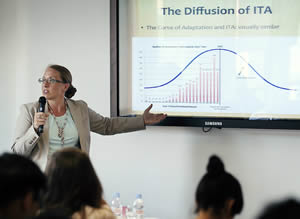Why is Investment Arbitration So Expensive? – A Groundbreaking Study Reveals Why and Suggests Possible Solutions

Costs are among the issues that the critics of international arbitration allege to justify the need to reform it. However, cognitive illusions and unfounded intuition can wreak havoc without understanding the real state of play. The field of investment arbitration is fraught with challenges, as there are many deeply held beliefs while access to objective data to test assumptions is very limited. Very few studies have holistically and critically explored the costs of investment treaty arbitration, putting reality into context and providing clear information for the broader debate about the future of international arbitration in general, and investment treaty arbitration in particular.
A recent study by AUWCL Professor Susan Franck reveals, for the first time, unique data about the real fiscal costs of investment treaty arbitration. Recognizing that costs ebb and flow over the lifetime of a dispute, on average, her analysis revealed that each party to an investment arbitration spends roughly $1.5 million per year during the proceeding. In combination, her data identified that, on average, each party paid approximately $4-5 million for legal counsel. Put another way, the combined cost of both parties’ counsel was around $9-10 million. Other data also revealed the challenges of investment arbitration. Namely, in the cases where tribunals awarded damages to the claimant, the awarded amounts were on average only $45 million, while the average damages claimed in that same sub-set of cases was around $171 million.
Reliable information on the effective costs and potential gains involved in investment arbitration allows for making effective policy decisions. At a general level, having access to real and balanced data is especially important given that the world has entered an era of "fake news” and cherry-picked information that requires verifiable assessment and fact-checking. More specifically, in the high stakes arena of international commercial activity and dispute settlement, the debate about the future of investment arbitration is at a fundamental inflection point—and concerns about costs are at the forefront, as witnessed by the centrality of the costs at the United Nations (UNCITRAL) and the World Bank (ICSID) discussions about reform of dispute settlement.
As proposed by Professor Franck, one question that needs to be asked at the outset of any dispute is whether arbitration is really the right way to go. Other forms of dispute resolution, such as negotiation or mediation, may be cheaper, permit greater party control, and potentially prove more efficient as a way to solve an investment dispute.
There are also opportunities within an arbitration to minimize or to decrease costs. ICSID’s current rule reform project sheds light on some procedural moments that could be organized in a more cost-effective manner. For instance, ICSID’s most recent proposals include the major innovation of requiring a Case Management Conference—as Professor Franck recommends in her new book—as a material opportunity to create efficiencies and lower costs. In addition, ICSID’s proposed rule-based timetables for tribunal constitution, challenges, and appointment demonstrate that there are ways to streamline the procedure. Security for costs can also be a tool with which tribunals can secure compliance with a cost award, especially when a party may lack good faith or has no apparent assets. In addition, there is room for reform on a laundry list of other issues, such as: requiring tribunals provide more costs data and explanations in their awards, creating an Advisory Committee on Rules Reform, changing pleading rules to front-load damage assessments, and regulating the ethics obligations of counsel with more rigor.
Another field of concern is the method that tribunals use to assess the ultimate allocation of costs. The “loser pays” principle, as well as the principle that each party bears its own costs, each have advantages and disadvantages. However, what is problematic is the findings of Professor Franck’s research, namely rather than a facially neutral rule on costs that is applied equally, she identified a reliable pattern whereby winning investors that were more likely to have costs shifted in their favor, as compared with winning states that were more likely to have to bear their own costs.
In sum, reliable data about the practice of investment arbitration can avoid cognitive illusions that lead to intuitive—and hence imprecise—decision making. Professor Susan Franck’s research, published in her 2019 Oxford University Press book, Arbitration Costs: Myths and Realities in Investment Treaty Arbitration, is a standard-setting contribution to the debate about the future of investment treaty arbitration.